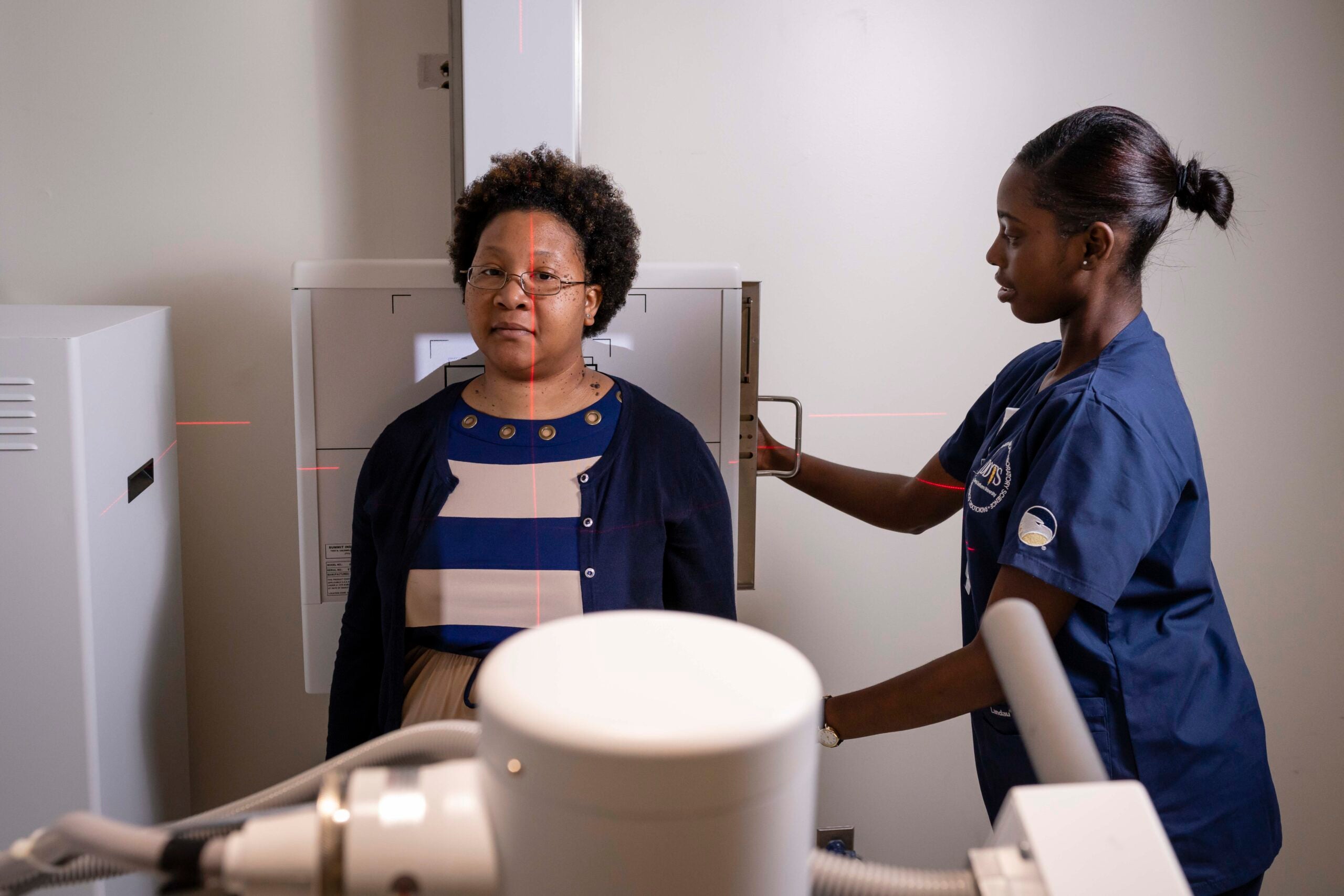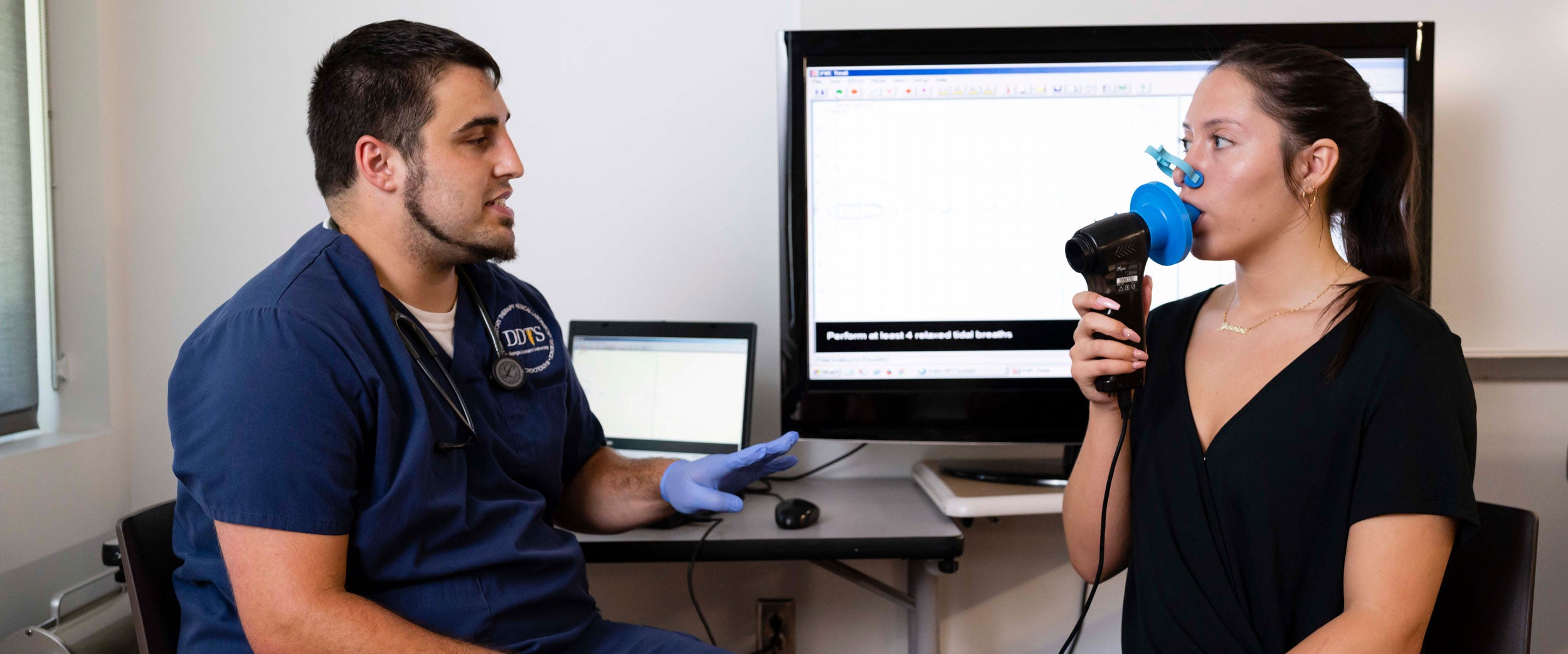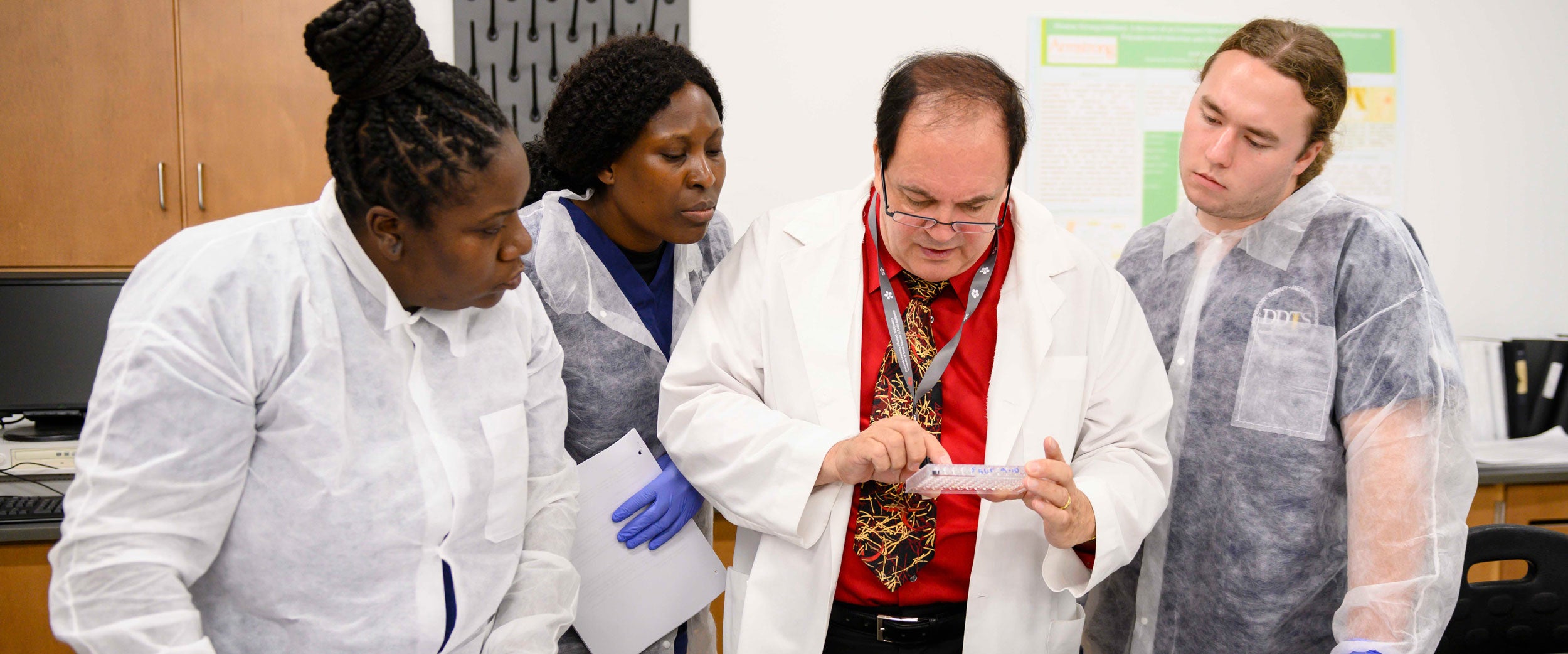Build a rewarding career that blends technology with patient care by studying radiography—a critical, fast-growing role in health care.
Locations
- Armstrong Campus (In Person)
Why Concentrate in Radiography at Georgia Southern?
- Develop high-demand skills in a fast-growing health care profession.
- Gain clinical experience through rewarding clinical rotations.
- JRCERT-accredited program.
- 83% job placement rate.
- 130 credit hours to completion.
Radiologist technicians use advanced imaging technology to care for patients and help doctors diagnose and treat medical conditions. As the U.S. population ages, the need for skilled radiology techs continues to increase, making radiography a sound career path.
The radiography degree concentration at Georgia Southern combines diverse, hands-on clinical experience with a strong academic foundation in radiologic science. When you graduate, you’ll be eligible to take the exam for certification by the American Registry of Radiologic Technologists. You’ll also have the opportunity to specialize and enhance your career prospects by pursuing additional certifications in Magnetic Resonance Imaging (MRI), Computed Tomography (CT) and mammography.
Ready to Apply?
What Can You Do with a Concentration in Radiography?
Radiographers, or radiologic technologists, use technology to perform diagnostic imaging on patients. The profession, which blends direct patient care with cutting-edge technology, is projected to grow faster than average, according to the U.S. Bureau of Labor Statistics.
You’ll be equipped to conduct X-rays, CT scans and MRIs as you assist physicians in diagnosing and treating patients. Because these skills are needed in so many fields of medicine, you’ll have the flexibility to work in a variety of settings, including hospitals, clinics and imaging centers.
Where our graduates work:
- Mayo Clinic
- Kaiser Permanente
- St. Joseph’s
- GE Healthcare
- Atrium Health
- Emory Healthcare
- Children’s Healthcare of Atlanta
- AdventHealth
- Memorial Health
- Wellstar Health System
- Northside Hospital
What our graduates do:
- Radiology technologist
- Radiographer
- MRI technologist
- CT scan technologist
- Diagnostic radiographer technologist
What You’ll Learn
Students pursuing the radiography degree concentration at Georgia Southern build a strong foundation of physics, math and science that supports advanced learning. You’ll move on to study the principles of radiologic examinations, including anatomy, imaging equipment, patient assessment, types of radiologic procedures and more. Finally, you’ll develop hands-on experience through clinical rotation at a variety of different clinics.
In addition to core curriculum classes, every radiologic sciences student completes courses on patient care, research methodologies, leadership and management, advanced radiologic sciences and medical communication skills.
See the CurriculumBuild Your Experience
Prepare for a high-tech, patient-focused career with the community support, hands-on learning and faculty access you need to succeed.
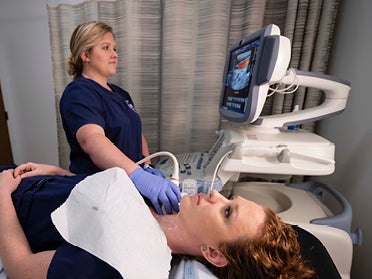
Real-World Experience
Learn how to use advanced imaging technology and care for actual patients as you participate in supervised clinical rotations where you’ll build confidence.
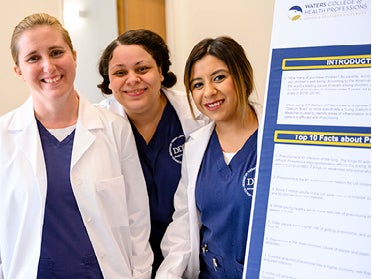
Student Organizations
Find community by joining student groups such as the Health Sciences Student Association (HSSA).
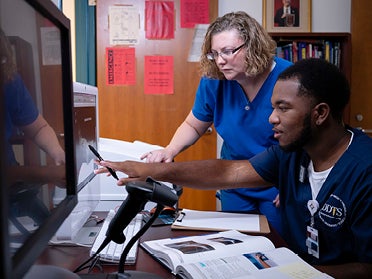
Facilities + Faculty
Work with nationally-recognized faculty scholars and practitioners during clinical experiences and while learning how to operate sophisticated imaging equipment and technology.
Take Action
Applications for the radiologic sciences program with a concentration in radiography are accepted from Nov. 15 through March 1.
Late applications will be considered on a case-by-case basis. Qualified applicants who met the March 1 deadline will be granted priority over applicants who did not meet the initial deadline. Certain programs may continue to review applications after the deadline until the program’s capacity is met.
Admission to Georgia Southern University does not guarantee admission to the concentrations in radiologic sciences. The Department of Clinical Sciences has a separate formal admissions process in addition to the admission process for the University. Applicants must submit a formal application to the program of interest and transcripts of all college and technical school coursework.
Follow these steps to complete the Georgia Southern application:
- Create an application account.
- Complete our online application using the PIN you received after creating your application account.
- Once complete, pay the $30 application fee or upload a valid fee waiver. Previous Georgia Southern applicants and dual enrollment students do not need to pay the fee.
- You can check your application status at My.GeorgiaSouthern.edu/admissions three days after completing your application. This page contains live information about your admission status, including a checklist of missing documents we need to make a decision.
Applicants to the radiologic sciences program must meet these minimum admission requirements:
- Acceptance into Georgia Southern University.
- Complete and pay the Allied Health Centralized Application Service (AHCAS) Application.
- Complete the entrance exam and submit the results by March 1. Applicants may contact the Georgia Southern University Testing Services at 912-344-2582 or visit MCC 206 for more information or to schedule the exam.
- Achieve a cumulative GPA of 2.5 or higher for all college work. Applicants with less than a 2.5 may be considered under special circumstances.
- Special Options (second certification) applicants must provide proof of ARDMS, ARRT or NMTCB certification.
- Students who are admitted to the program are strongly encouraged to complete the remaining core courses during the summer semester before the start of the program. Failure to meet all core requirements before beginning the program may delay your graduation.
- Prior to applying to the program, you must complete the following:
- 50 semester hours of core degree requirements, which include two college English composition courses and college algebra or higher.
- Required lab sciences (significant preference for admission will be given to those applicants that have completed all of the five required sciences):
- Radiography – must include Human Anatomy and Physiology I with lab and three additional lab sciences in the program of study.
Applicants not meeting the criteria stated above may apply and will be considered under special circumstances at a later date.
A new class begins in August (fall semester) each year. Applications will be considered on a competitive basis, and written notification of acceptance will begin in late March (no one will be notified of acceptance by phone). Applications received after the submission deadline will be considered only if seats are available. The amount of completed coursework, the number of science courses completed, entrance exam scores and GPA determine competitiveness. Additional points may be awarded for completion of selected coursework in the major. Interviews may be required for qualified candidates. Please see your advisor for details.
Please note that prior conviction of a felony or misdemeanor may prevent you from sitting for the national certification examination. If you have been convicted of either a felony or misdemeanor, you must complete the pre-application review process as prescribed by the certification agency and provide the Department with verification of eligibility for the examination.
Georgia Southern University is an equal-opportunity education institution and does not discriminate based on sex, race, age, religion, sexual orientation, disability, or national origin in employment, admissions or activities.
Apply as a First-Year Student Transfer to Georgia SouthernThe radiography degree concentration at Georgia Southern University is accredited by the Joint Review Committee on Education in Radiologic Technology. The program’s current award is accredited for a period of 5-years. General program accreditation information and the current accreditation award letter can be found here.
JRCERT
20 North Wacker Drive, Suite 2850
Chicago, IL 60606-3182
312-704-5300
mail@jrcert.org
The following is the most current program effectiveness data for the radiography program at Georgia Southern University. Our programmatic accreditation agency, the Joint Review Committee on Education in Radiologic Technology (JRCERT), defines and publishes this information.
Credentialing Examination: The number of students who pass, on the first attempt, the American Registry of Radiologic Technologists (ARRT) certification examination, or an unrestricted state licensing examination, compared with the number of graduates who take the examination within six months of graduation. The five-year average benchmark established by the JRCERT is 75%.
Credentialing Examination Rate
Number passed on 1st attempt divided by number attempted within 6 months of graduation.
Year Results
Year 1-2019 19 of 19-100%
Year 2-2020 7 of 14-50%
Year 3-2021 19 of 21-90%
Year 4-2022 14 of 17-82%
Year 5-2023 12 of 16-75%
Program 5-Year Average 71 of 87-81.6%
Job Placement: The number of graduates employed in the radiologic sciences compared to the number of graduates actively seeking employment in the radiologic sciences within twelve months of graduating. The five-year average benchmark established by the JRCERT is 75%.
Job Placement Rate
Number employed divided by number actively seeking employment within 12 months of graduation.
Year Results
Year 1-2019 16 of 19-84%
Year 2-2020 14 of 19-74%
Year 3-2021 17 of 19-89%
Year 4-2022 17 of 19-89%
Year 5-2023 14 of 18-78%
Program 5-Year Average 78 of 94-83.0%
Program Completion: The number of students who complete the program within the stated program length. The annual benchmark established by the program is 75%.
Program Completion Rate
Number graduated divided by number started the program.
Year Results
Year-2023 18 of 19Annual Completion Rate 94.7%
Goal 1: Students will demonstrate clinical competency
- Students will correctly apply patient positioning skills.
- Students will select appropriate technical factors.
Goal 2: Students will demonstrate the use of critical thinking/problem solving skills
- Students will demonstrate organization of information/thought.
- Students will be able to critically think through patients procedures to obtain diagnostic quality radiographs.
Goal 3: Students will demonstrate effective communication skills
- Students will demonstrate the ability to utilize written communication effectively.
- Students will utilize effective verbal communication.
Goal 4: Students will exhibit professional growth
- Students will perform as an effective team member and demonstrate professionalism in the field.
- Students will understand the importance of professional growth and development in the profession.
The Department of Clinical Sciences anticipates that graduates of this program will seek the following professional state licenses or national certifications: Registered Radiographer, R.T. (R). and state licensure.
The Department of Clinical Sciences has determined the required classes and educational activities of this academic program will qualify a graduate of this program to take the national ARRT examination to obtain Registered Radiographer, RT(R)(ARRT) credentials. The department has not determined whether this program satisfies the requirements of all states and territories for the Registered Radiation Therapist, RT(T) or state licensure. Visit the American Society of Radiologic Technologists to determine the requirements of your state or territory.
Many of the clinical programs offered by the Waters College of Health Professions require a clinical internship or practicum experience to fulfill degree requirements. Pursuant to the University’s legal agreements, participants in clinical experiences are required to abide by the workplace rules of the clinical site. Sometimes these rules include vaccination requirements. As always, WCHP will continue to make every effort to place students at clinical sites. However, please be aware that we may be unable to locate a site to accept unvaccinated students, which may cause a delay or inability to progress and complete the program of study.
Related Programs
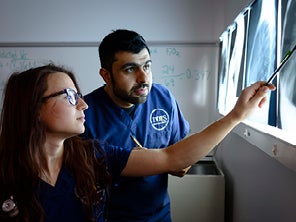
Take the Next Step
Support patients and physicians alike with high-demand diagnostic skills. Ask us about the radiography degree concentration at Georgia Southern.
Contact Us
Program Director
Sharon Gilliard-Smith,
Phone: 912-344-2986
sgsmith@georgiasouthern.edu
Radiologic Sciences
Phone: 912-344-2550
radsci@georgiasouthern.edu
Department of Clinical Sciences
Georgia Southern University Armstrong Campus
Department 4902
11935 Abercorn Street
Savannah, GA 31419

